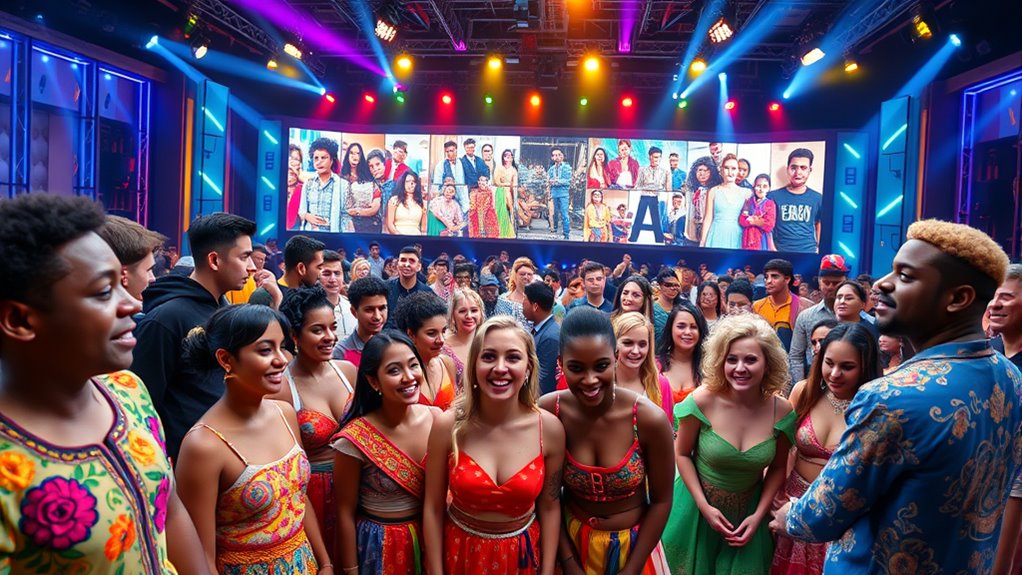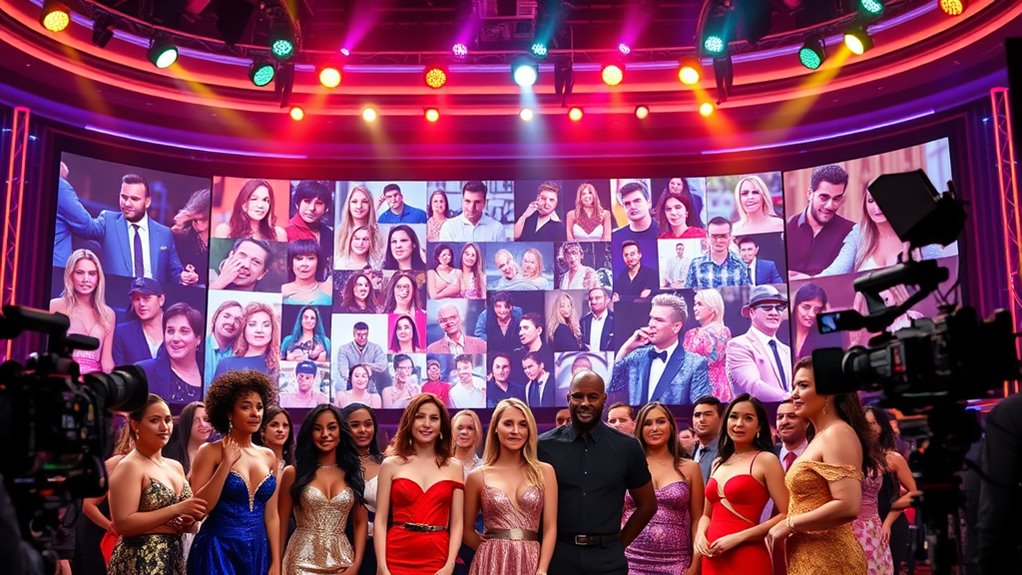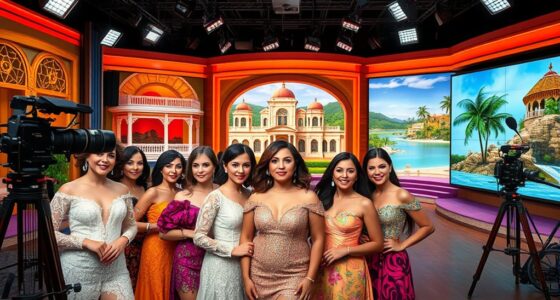Global reality-TV formats influence perceptions of different cultures by shaping social norms and spreading ideas worldwide. They often portray ethnic groups through stereotypes or authentic images, which can reinforce or challenge stereotypes in viewers’ minds. These shows have a powerful reach, impacting societal expectations around gender, family, and social roles across borders. By understanding how framing and editing affect these portrayals, you’ll see how they can both promote diversity or entrench bias. Keep exploring to learn more about their cultural effects.
Key Takeaways
- Global reality TV formats shape societal norms by highlighting or challenging stereotypes related to ethnicity, gender, and social roles.
- They influence perceptions of cultural identities through selective editing that emphasizes exoticism, authenticity, or stereotypes.
- International dissemination spreads ideas about social hierarchies, family structures, and cultural values across diverse audiences.
- The framing techniques used in editing affect whether viewers interpret these formats as reinforcing or challenging societal expectations.
- These shows can promote social change by showcasing diverse lifestyles or reinforce biases, depending on content and presentation.

Global reality-TV formats have become powerful tools for shaping cultural perceptions and social norms across the world. When you watch these shows, you may not realize how deeply they influence your understanding of different cultures, identities, and societal expectations. One of the most significant ways they do this is through ethnic representation. As these programs travel across borders, they often portray specific ethnic groups in particular lights, either reinforcing stereotypes or challenging them. If you’re watching a reality show set in a different country, you’ll notice how certain ethnic identities are highlighted or marginalized. Sometimes, the editing emphasizes exoticism or stereotypes, which can perpetuate misconceptions. Alternatively, some formats aim to showcase diverse ethnic backgrounds authentically, fostering understanding and empathy. But the impact depends heavily on how these representations are framed. These shows don’t just reflect societal norms; they actively shape them. When you see a particular behavior rewarded or criticized on a reality-TV program, it influences your perception of what’s acceptable or desirable within that society. For example, if a show consistently rewards assertiveness in women or depicts certain family structures as ideal, it subtly reinforces those norms as standards to aspire to. Over time, repeated portrayals can shift societal expectations, influencing everything from fashion choices to interpersonal relationships. This effect is especially potent when you consider the global reach of these formats. A reality show produced in one country can influence viewers worldwide, spreading specific ideas about gender roles, social hierarchies, or cultural values. Additionally, the use of media framing techniques in editing can significantly impact how audiences interpret these portrayals and their cultural significance. Furthermore, the portrayal of societal norms in these formats can either challenge traditional beliefs or reinforce them. When you see a show that celebrates unconventional lifestyles or diverse family units, it can promote greater acceptance and understanding. Conversely, if a format favors traditional norms and stereotypes, it can entrench existing biases. This dual capacity makes global reality-TV formats powerful tools for social change or reinforcement, depending on their content and framing. In the end, you, as a viewer, are part of this dynamic process. The shows you watch shape your perceptions, knowingly or unknowingly, about different ethnicities and societal expectations. Recognizing how these formats influence cultural perceptions can help you critically engage with what you see, whether it’s challenging stereotypes or understanding the norms they promote. Reality TV has become more than entertainment; it’s a mirror and a mold for societal values, and your awareness of this influence is key to understanding its true cultural impact.
Frequently Asked Questions
How Do Reality TV Formats Influence Local Cultural Identities?
You might notice that reality TV formats influence local cultural identities by promoting cultural preservation through showcasing traditions and customs. However, they can also lead to identity transformation, as local audiences adopt new trends and ideas from global formats. This dual effect shapes how communities see themselves, balancing respect for their roots with embracing modern influences. Ultimately, reality TV acts as both a preservative and a transformer of cultural identities.
What Are the Ethical Concerns Surrounding Global Reality TV Adaptations?
You should consider the ethical concerns surrounding global reality TV adaptations, especially exploitation concerns and cultural commodification. These shows often prioritize entertainment over respect for local cultures, risking exploitation of participants and communities. By commodifying cultural practices, producers can distort or trivialize traditions, leading to ethical dilemmas. As a viewer, you might question whether such programs responsibly represent cultures or simply commercialize them for profit, raising important moral issues.
How Do These Shows Impact Youth Perceptions Worldwide?
Think of global reality TV shows as mirrors reflecting society’s dreams. You, as a youth viewer, may see these shows shaping your perceptions of success, beauty, and fame. They influence teenage aspirations and can amplify social media influence, making you believe that fame is just a vote away. This impact can skew your understanding of reality, encouraging you to chase illusions instead of authentic personal growth.
What Economic Effects Do Global Reality TV Formats Have on Local Industries?
You see that global reality TV formats boost economic growth by attracting international audiences and advertising revenue. They also create new opportunities for local employment, from production crews to talent scouts. When these shows come to your area, they can stimulate local economies, increase tourism, and foster skill development. Overall, these formats have a positive economic impact, helping local industries thrive and gain international exposure.
How Do Creators Balance Cultural Sensitivity With Entertainment?
You need to balance cultural sensitivity with entertainment by focusing on cultural adaptation, ensuring content respects local traditions while engaging viewers. To do this, you incorporate familiar elements and avoid stereotypes, fostering viewer engagement without alienating audiences. By understanding cultural nuances and incorporating local perspectives, you create authentic experiences that resonate, making your show both respectful and entertaining. This balance is key to success in diverse markets.
Conclusion
As you watch these global reality-TV formats, remember that they’re like mirrors reflecting our shared human desires and fears. They shape perceptions and blur cultural boundaries, proving that “the more things change, the more they stay the same.” By embracing this, you see how entertainment not only entertains but also connects us across borders, weaving a vibrant tapestry of diverse stories and values, reminding us that we’re all part of a bigger, interconnected world.









